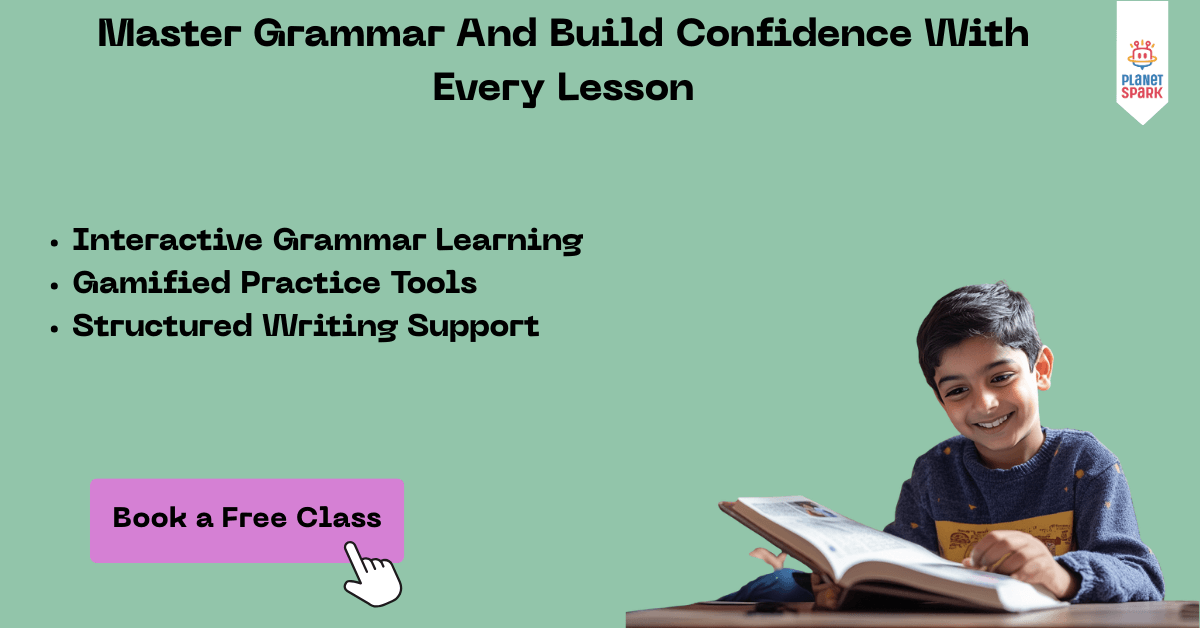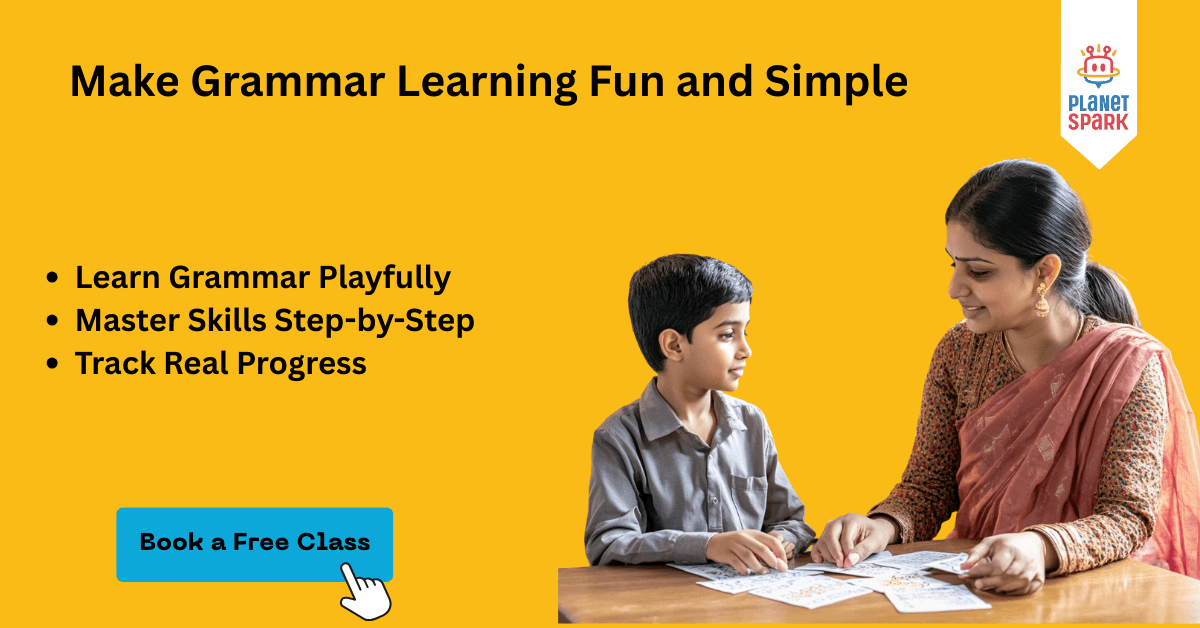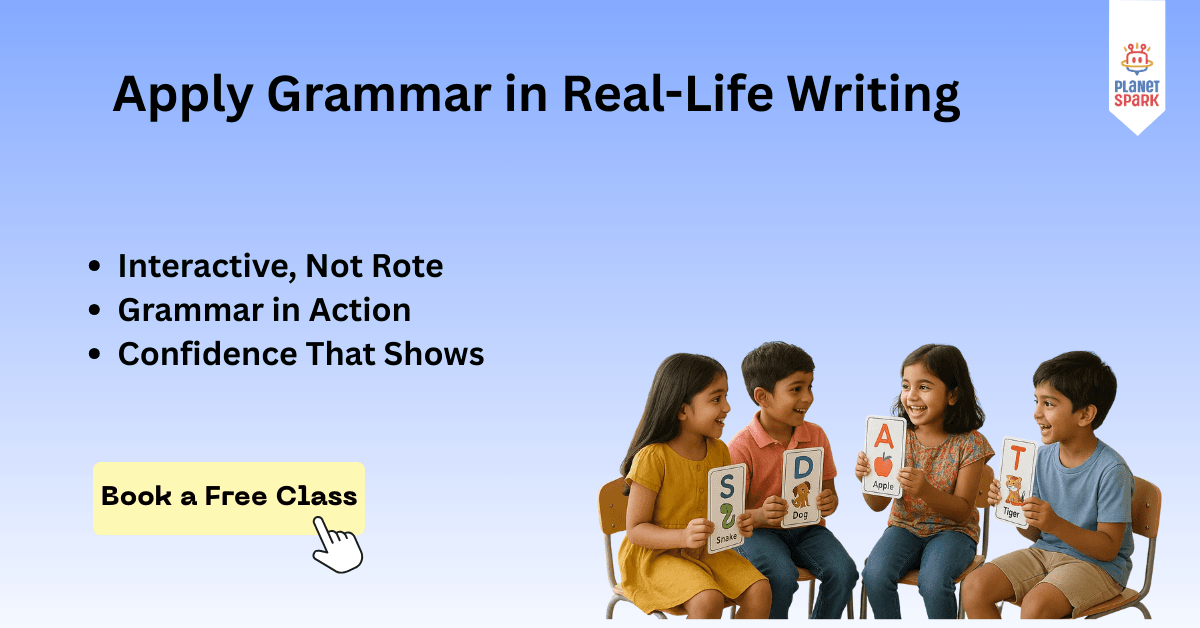Teach Verbs to Class 2 Kids – Easy and Fun Learning Methods

Table of Contents
- What Are Verbs? A Simple Explanation for Kids
- Why Teaching Verbs Early Is Important
- Fun Ways to Teach Verbs to Class 2 Kids
- Types of Verbs for Class 2 Kids
- How to Teach Verbs Easily – Step by Step
- Common Mistakes Kids Make and How to Correct Them
- Engaging Activities to Reinforce Learning
- Tips for Parents to Help Kids Learn Verbs
- Sample Lesson Plan to Teach Verbs to Class 2
- Benefits of Learning Verbs Early
- Creative Activities to Reinforce Verb Learning at Home
- How to Assess Your Child’s Understanding of Verbs
- Enhance Your Child’s Grammar Skills with PlanetSpark
- Frequently Asked Questions (FAQs)
Teaching verbs to Class 2 kids can be a fun and engaging experience if done creatively. Verbs are action words, and helping young learners understand them clearly builds the foundation for strong grammar skills. In this guide, we’ll explore practical methods, examples, and activities that make learning verbs simple and enjoyable.

What Are Verbs? A Simple Explanation for Kids
Verbs are words that show an action, state, or occurrence. For Class 2 kids, it’s best to explain verbs as “action words” that tell what someone or something is doing.
Examples of Verbs for Kids:
Run
Jump
Eat
Sleep
Play
Teaching kids with simple, daily-life examples helps them relate and remember verbs easily.
Why Teaching Verbs Early Is Important
Understanding verbs is crucial because they:
Help form sentences correctly
Improve reading and writing skills
Make communication clear and meaningful
Lay a strong foundation for advanced grammar
When kids grasp verbs early, they can express themselves better in both writing and speaking.
Ignite Your Child’s Grammar Skills
Fun Ways to Teach Verbs to Class 2 Kids
Engaging activities make learning verbs enjoyable. Here are some methods:
1. Use Action Games
Play charades where kids act out verbs.
Example: One child acts “jump,” another guesses the verb.
Helps in visual and physical learning.
2. Storytelling with Actions
Read short stories and highlight verbs.
Ask kids to act out the verbs they hear.
Reinforces verb recognition in context.
3. Verb Flashcards
Create cards with pictures and action words.
Show a card and ask kids to say or act the verb.
Great for visual learners.
4. Daily Routine Activities
Encourage kids to describe their day using verbs.
Example: “I wake up, eat, and play.”
Makes learning practical and relatable.
5. Verb Sorting Games
Give a mix of nouns and verbs, and ask kids to sort them.
Helps differentiate verbs from other words.
Make Learning Verbs Fun and Easy
Types of Verbs for Class 2 Kids
It’s helpful to introduce simple types of verbs early:
1. Action Verbs
Show physical or mental actions.
Examples: Run, write, think, sing
2. Helping Verbs
Support main verbs to show time or possibility.
Examples: Is, am, are, was, were
3. Linking Verbs
Connect the subject with a description or state.
Examples: Is, seem, become
Teaching Tip:
How to Teach Verbs Easily – Step by Step
Here’s a simple approach for Class 2 teachers and parents:
Step 1: Introduce the Concept
Explain verbs as action words using real-life examples.
Step 2: Show Examples
Use pictures, flashcards, and daily routine examples.
Step 3: Encourage Practice
Ask kids to write simple sentences with verbs.
Example: “I play in the park.”
Step 4: Interactive Activities
Incorporate games, storytelling, and charades.
Step 5: Review and Reinforce
Use worksheets and quizzes weekly.
Praise kids for correct usage to boost confidence.
Help Your Child Excel in English
Common Mistakes Kids Make and How to Correct Them
Confusing nouns with verbs
Example mistake: “I table.”
Solution: Show the difference between an action and an object.
Using wrong verb tense
Example mistake: “I eat yesterday.”
Solution: Teach past, present, and future forms slowly.
Skipping verbs in sentences
Example mistake: “I to park.”
Solution: Reinforce complete sentence structure with verbs.
Engaging Activities to Reinforce Learning
1. Verb Hunt
Ask kids to find verbs in books or stories.
2. Drawing Actions
Draw a picture and write the action verb below.
3. Verb Matching Games
Match pictures with the correct verb.
4. Daily Journal
Encourage kids to write 3 verbs they did today.
5. Songs and Rhymes
Teach action songs or rhymes to remember verbs.
Boost Your Child’s Confidence with Verbs
Tips for Parents to Help Kids Learn Verbs
Use daily activities: Ask kids to describe what they’re doing.
Praise effort: Positive reinforcement improves retention.
Read stories together: Highlight and act out verbs.
Use visual aids: Flashcards, charts, and videos.
Be patient: Kids learn gradually with repetition and fun.
Sample Lesson Plan to Teach Verbs to Class 2
Objective: Identify and use action verbs in sentences.
Materials: Flashcards, storybooks, chart, drawing sheets.
Steps:
Introduce verbs with simple definition.
Show examples using flashcards and actions.
Storytime: Highlight verbs in the story.
Activity: Verb charades and drawing.
Practice: Make 3–5 sentences using new verbs.
Review: Quick quiz at the end.
Benefits of Learning Verbs Early
Improves sentence formation
Enhances communication skills
Boosts reading and writing confidence
Builds strong grammar foundation
By making verbs fun and interactive, kids not only learn grammar but also develop a love for language.
Transform Grammar Learning into Fun
Creative Activities to Reinforce Verb Learning at Home
Learning verbs doesn’t have to stop in the classroom. Parents can play an active role in reinforcing verb knowledge at home through fun and practical activities. These exercises help Class 2 kids practice verbs in real-life situations, making the learning process more meaningful.
1. Daily Action Diary
Encourage your child to write a simple diary entry describing what they did each day using verbs.
Example: “I played football, ate my breakfast, and read a story.”
This helps them identify verbs in context and improves writing skills.
2. Verb Scavenger Hunt
Turn learning into a fun scavenger hunt. Ask kids to find and list verbs from:
Books
Storybooks or comics
Everyday activities around the house
This game enhances observation skills and helps children recognize verbs in various contexts.
3. Act It Out
Physical activity reinforces learning for young children.
Ask your child to act out verbs while the family guesses them.
Example: jumping, running, reading, eating.
This method combines kinesthetic learning with fun, making verbs memorable.
4. Verb Sorting and Grouping
Create cards with different verbs and ask your child to:
Sort verbs by type (action, helping, linking)
Group verbs by tense (past, present, future)
This encourages analytical thinking and deepens understanding of grammar.
5. Use Technology and Apps
Several educational apps and online games focus on verb practice for kids.
Interactive quizzes, matching games, and story-based apps help reinforce classroom learning.
Ensure screen time is balanced with physical and practical activities.
6. Story Creation with Verbs
How to Assess Your Child’s Understanding of Verbs
Regular assessment helps ensure that Class 2 kids are grasping verbs effectively. Here are some simple and interactive ways to check their understanding without making it stressful:
1. Quick Verb Quizzes
Give your child short, 5–10 question quizzes with sentences missing verbs.
Example: “I ___ to the park yesterday.” (Answer: went)
This helps in reinforcing correct verb usage and identifying areas that need practice.
2. Verb Journals
Ask your child to maintain a small journal where they write 3–5 verbs they used each day.
Review the journal together and discuss any mistakes or new verbs.
Encourages self-reflection and consistent practice.
3. Story Retelling
Read a short story together, then ask your child to retell it using as many verbs as possible.
This activity strengthens memory, sentence formation, and verb usage in context.
4. Interactive Games
Use verb-based board games, flashcard games, or online apps to check understanding.
For example, kids can sort verbs into action, linking, and helping categories.
Makes assessment fun and engaging, not intimidating.
5. Peer Activities
Encourage children to work in pairs or small groups to create sentences or act out verbs.
Teachers or parents can observe and give feedback.
Helps kids learn collaboratively and improve communication skills.
6. Reward System
Praise or small rewards for correct usage of verbs motivate kids to practice regularly.
Positive reinforcement makes learning consistent and enjoyable.
Enhance Your Child’s Grammar Skills with PlanetSpark
PlanetSpark’s English Grammar Course is designed to make learning grammar fun, interactive, and effective for young learners. Through creative lessons, games, and engaging activities, children master verbs, nouns, tenses, and sentence formation with ease.
Key benefits of the course:
Build strong grammar foundations for confident reading and writing
Interactive learning with quizzes, stories, and role-plays
Personalized guidance suited to each child’s pace
Boosts communication skills alongside grammar knowledge
Give your child the opportunity to excel in English and develop a love for language.
Enroll in PlanetSpark’s English Grammar Course today and watch them learn, grow, and shine!
Frequently Asked Questions (FAQs)
1. How can I teach verbs to Class 2 kids effectively?
Use daily examples, action games, and storytelling to help kids understand and practice verbs.
2. What are some examples of verbs for Class 2 kids?
Run, jump, eat, play, write, sing, sleep, read, draw, talk.
3. How can parents help kids learn verbs at home?
Encourage daily journaling, reading stories, acting out verbs, and flashcard games.
4. How many types of verbs should Class 2 kids learn?
Focus on action verbs, helping verbs, and linking verbs in a simple and interactive way.
5. How do games help kids learn verbs?
Games like charades, verb hunts, and matching activities make learning fun and memorable.
6. Can visual aids improve verb learning?
Yes, flashcards, charts, and drawing activities help kids remember verbs faster.
7. How often should kids practice verbs?
Daily short practice sessions, combined with storytelling or activities, work best for long-term retention.
Personalized Communication Report
Record a video to get a AI generated personalized communication report for your child


